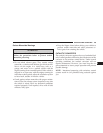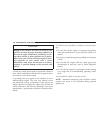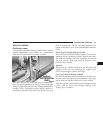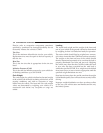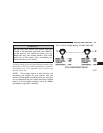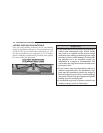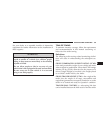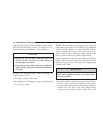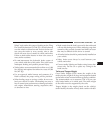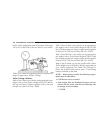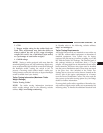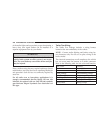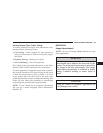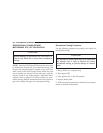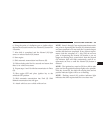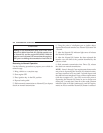
WheelЉ style trailer, this range of loading on the ЉKing
PinЉ should be between 15% and 25%.) Loads balanced
over the wheels or biased toward Љheavier in the rearЉ
can cause the trailer to sway severely side to side
which will cause loss of control of vehicle and trailer.
Failure to load trailers heavier in front is the cause of
many trailer accidents.
•
Do not interconnect the hydraulic brake system of
your vehicle with that of the trailer. This could cause
inadequate braking and possible personal injury.
•
Trailer brakes are recommended for trailers over 1,000
lbs. (454 kg) and required for trailers in excess of 2,000
lbs. (907 kg).
•
Use an approved trailer harness and connector. If a
hitch is ordered, the proper wiring will be provided.
•
When hauling cargo or towing a trailer, do not over-
load your vehicle or trailer. Overloading can cause a
loss of control, poor performance or damage to brakes,
axle, engine, transmission, steering, suspension, chas-
sis structure or tires.
•
Make certain that the load is secured in the trailer and
will not shift during travel. When trailering cargo that
cannot be fully secured, dynamic load shifts can occur
that may be difficult for the driver to control.
•
All trailer hitches should be professionally installed on
your vehicle.
•
Safety chains must always be used between your
vehicle and trailer.
•
Connect trailer lighting and brakes using factory har-
nesses only. Do not cut or splice any wiring to the
brake circuits.
Trailer and Tongue Weight
Gross Trailer Weight (GTW) means the weight of the
trailer plus the weight of all cargo and equipment loaded
on the trailer when in actual underway towing condition.
The recommended way to measure GTW is to put your
fully loaded trailer on a vehicle scale. The entire weight
of the trailer must be supported by the scale.
Tongue Weight is the weight placed on the vehicle’s
trailer hitch by the trailer. Always load a trailer with 60%
STARTING AND OPERATING 197
5



